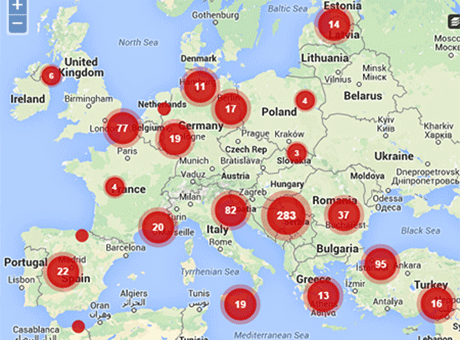11 Jun 2015 | Europe and Central Asia, mobile, News, Russia
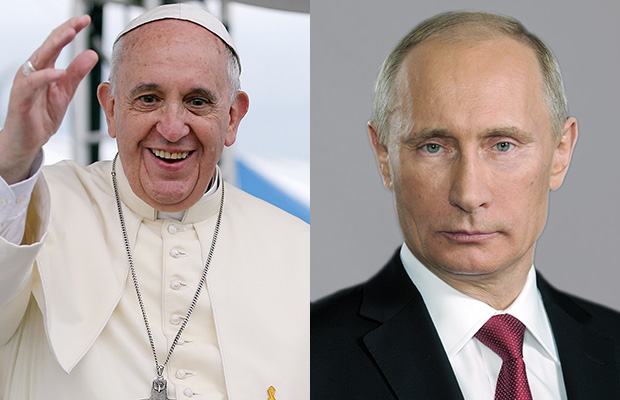
Pope Francis met with Russian President Vladimir Putin (Photos: Pope Francis: Korean Culture and Information Service/Wikimedia Commons; Vladimir Putin: Kremlin.ru/Wikimedia Commons)
What might have happened when the leader of the world’s largest state met the leader of the world’s smallest?
Francis: Welcome to the Vatican, Vladimir. I hope you are not put off by my incredibly humble surroundings, here in my own humble city state. I am very humble, you know.
Vladimir: Yes, so your aides reminded me, several times. It is very important for men as important as ourselves to stay humble, I believe. We would not want to, as they say, “lose the run of ourselves”. Tell me, dear humble priest: I hear you are a communist now?
Francis (laughing, filled with divine light and humility): Haha! Not quite, comrade. The only redistribution I’m interested in is the redistribution of Christ’s love. The only means of production I want to seize control of are the means of production of compassion in men’s hearts. The only permanent revol…
Vlad: Right, yes, I think I get it. So, the whole “praying for the conversion of Russia” thing: that’s not a thing any more?
Frank: Oh that? Lord no. Thing of the past. If anything, we’re praying for the rest of the world to be more like Russia. Look at the rest of the world: secular, godless, decadent, lacking a certain…what’s the word I’m looking for?
Vlad: Humility?
Frank: Yeah, that’s the one. Lacking humility. But Russia. In Russia, the church is still number one. Admittedly, the wrong church, but, well, who am I to be picky?
Vlad: Good to know. So, where did the communist thing come from?
Frank: Ah, the Americans. You know how they are.
Vlad: I see. So you have been defamed by the Yanqui too? I have had my trouble with them. They even claimed I invaded Ukraine. HAHAHA!
Frank (nervously, humbly): HAHAHAHAHAH (hmm). Daft, of course. I mean, you didn’t, did you?
Vlad: Of course not! Why would I do that?
Frank: Well, they might have insulted your mother. In which case you’d have every right, as I outlined in my pamphlet: “Ego In Gutture Ferrum, Punk”
Vlad: Um, right.
Frank: It’s totally theologically sound. As Jesus himself said: “I tell you, do not resist an evil person. If anyone slaps you on the right cheek, punch them in the throat.”
Vlad (under breath): Catholics are weird
Frank: You talking about my mother?
Vlad: No! No! Lord no. Holy Father, if I may call you that…
Frank: I humbly accept the title
Vlad: Holy Father, it is true, as you said, that if someone insults someone’s mother, they should expect a punch?
Fran: It’s not just me saying that. Jesus says it!
Vlad: I’m almost certain he doesn’t, but hey, you’re the Pope.
Frank: I am, you know.
Vlad: Anyway, what does one do when someone, say, doesn’t insult your mother, but insults you, and you can’t punch them in the throat because they’re women and apparently you’re not supposed to do that anymore?
Frank: Not following.
Vlad: That, group: those awful people whose name I can’t really say in front of a priest.
Frank: Ah! The Pussy Riots band!
Vlad: Well, I was thinking “the feminists”, but yes, them. Was it OK to send them to the Gulag?
Frank: I’m not really sure I’m in a position to comment here. The organisation of which I humbly find myself head doesn’t have…we don’t have a great track record on the whole locking-up-unruly-girls thing.
Vlad: Oh yes, that. You’ve stopped doing that, right?
Frank: Pretty much. How about you? Your lot were pretty keen on the whole packing-em-off thing.
Vlad: Ha, yes. I’ll square with you, Frank. Can I call you Frank?
Frank: No.
Vlad: Ah. Ok. Awks. Er, I’ll square with you, Holy Father: the gulag thing’s a hard habit to break. You know, you’ve got the rigged courts, the fantasy charges… but most of all, I mean…it’s heritage, isn’t it? Tradition.
Frank: Tradition!
Vlad: Tradition, you know…(sings) “Il Papa. Il Papa, Tradition!”
Frank: Stop that.
Vlad: Sorry, can’t help myself. Love that show.
Frank: Yes, we all do. But, y’know, not here. Vatican and all that. Don’t have a great record on those people either.
Vlad. Who? Musical theatre people?
Frank: Well, I was going to say the…but yes, the musical theatre people.
Vlad: We too have our trouble with the musical theatre people. Must they be so theatrical? In front of the children? I mean, what if everyone was theatrical? What then? Everyone would be putting the show on right here and no one would be making babies.
Frank: So true.
Vlad: I mean, it’s not like I’m obsessed or anything. I’m not that bothered by them, honest. Hell, I’ve even been to a few musicals.
Frank: Let he among us who hasn’t been touched by musical theatre throw the first punch.
Vlad: Um, right.
Frank: Ha! I see even you are a bit put out by the constant talk of punching. But I was a bouncer in Buenos Aires. And you know what we say in Argentina? “You can’t spell ‘Bad Boy’ without BA!” Ha!
Vlad: Good one. Back in Leningrad we used to say “You can’t spell ‘Please! Stop! I’ll confess to anything!’ without ‘KGB’”
Frank: ?
Vlad: It works in Russian. Different alphabet.
Frank: Of course.
Vlad: Anyway, where was I? Yes, the musical theatre people. I mean, all very well in it’s place…
Frank: New York?
Vlad: EXACTLY. But why bring it to Russia?
Frank: Exactly. Sometimes its like they think they should have their own stage in their own building in every parish in the world where they can get all dressed up and put on their strange little performances, and we’re all supposed to worship them for it. Such arrogance, a humble man such as I cannot countenance.
Vlad: Quite.
Frank: I’m glad we can agree on so much. Tell me, you seem like a good, God-fearing, throat-punching man…
Vlad: Why thank you
Frank: Why is it you get such bad press?
Vlad: Well, I’ve got a plan to deal with that.
Frank: Really? Me too. I noticed the guy before me came across as a bit austere, so I decided to say all the same things he said, but in a much more liberal-sounding way. The media loves it. So, what’s your plan for dealing with journalists?
Vlad: Kill them.
Frank: Oh! Ah well, suffer little children to come unto me, as the Lord said.
Vlad: I’m pretty sure that doesn’t mean what you think it means.
Frank: Vlad, you’re a pal, but who’s the one with a direct line to God here?
Vlad: Good question, comrade. Good question.
(Lunch is served).
This column was posted on 12 June 2015 at indexoncensorship.org
1 May 2015 | Denmark, European Union, France, Germany, Greece, Hungary, Ireland, Italy, Macedonia, mobile, News, Poland, Spain, Turkey, Ukraine, United Kingdom
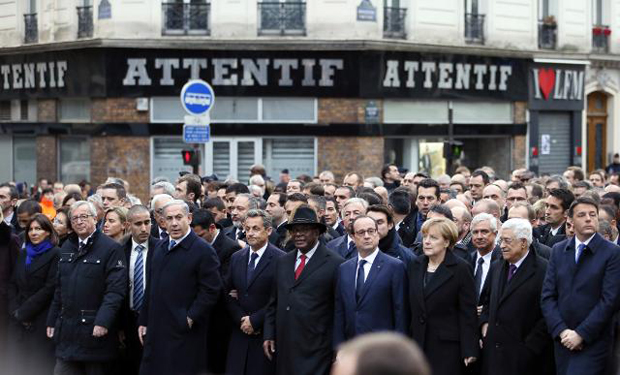
As we approach World Press Freedom Day, the right to freedom of expression will again be celebrated as an inalienable European value across the continent — by the public, the media and politicians alike. But to many, this will mean little more than engaging in a well trodden mental routine. We hardly consider the difficulties that freedom of expression faces in practice.
In the first part of 2015, more than a third of journalist killings in the word took place in two European countries; France and Ukraine. If it is true that Europe’s reactions to the Charlie Hebdo attack — the majority of them very emotional — were salubrious, they simultaneously gave rise to ambiguous situations. Many of the leaders that will on 3 May reaffirm their commitment free expression, supported the same message by taking part in the historic march in Paris on 11 January.
But upon seeing Angela Merkel, some were also reminded that Germany continues to treat blasphemy as a crime — as do Denmark, Spain, Poland and Greece, among others. Ireland, whose Enda Kenny was also in attendance, has a constitution which specifically mentions blasphemy and in 2010 enacted a new law against it. All these European countries defend themselves by saying that they do not apply their laws against “blasphemers”. That argument does not carry much weight when it comes to opposing those countries — Saudi Arabia, Iran, various Asian countries — that have tried to turn blasphemy into a universal crime recognised by the UN.
Spain’s Mariano Rajoy too marched in solidarity, but his government has taken steps to promote changes in the penal code that would “represent a serious threat to freedom of information, expression and the press”.
And what was Viktor Orban doing in Paris? The Hungarian president has reunified Hungary‘s public media so as to better bind them to his own party. Despite being the leader of an EU country, Orban has followed Vladimir Putin’s example. In this experimental model, the Andrei Sakharov Center and Museum is no longer ordered to close as it was in the old days, but rather fined 300,000 roubles (€5,000) for failing to register as a “foreign agent”. One day brings an announcement of compulsory registration for bloggers in Russia; another day, harassment against Russian and Hungarian NGOs perceived as “unpatriotic”.
Turkish Prime Minister Ahmet Davutohlu traveled to Paris, only to later label Charlie Hebdo’s post-attack issue a “provocation”. A reminder: Turkey is an EU candidate country where dozens of journalists have been sentenced to prison, and where various internet sites, including those that dared to reproduce some of Charlie Hebdo’s caricatures, have been blocked.
But also present at the march, were various representatives of European journalists — myself included. Just behind the Charlie Hebdo survivors, we carried a banner with the message “Nous sommes Charlie”.
Walking next to me was Franco Siddi, of the Italian National Press Federation. He talked to me about how imprisonment for defamation is still a possibility in Italy, though the European Court of Human Rights has ruled it a disproportionate punishment.
In my home country Spain too, this possibility of imprisonment remains, even if under Spanish jurisprudence freedom of expression consistently prevails over the demands of plaintiffs. In Italy, the situation is the same, yet my Italian colleagues point out that in 2014 alone, 462 journalists in the country were threatened with legal action for alleged acts of defamation. And while the current proposal for reform being considered foresees eliminating the possibility of jail time, it increases the potential fines.
This is not the only potential legal threat facing European journalists. Long before 9/11, there existed a reflexive habit of passing “urgent” laws under security pretexts, as in the UK during the most difficult years of the Northern Ireland conflict. The current model is the United States’ Patriot Act, which has recently been discussed in France. Meanwhile, in Britain and Spain are debating what free expression activists describe as “gag laws”. In Macedonia, the sentencing of the investigative journalist Tomislav Kezarovski to two years in prison under one of these security inspired laws stands out as a warning sign.
Against this worrying backdrop, across Europe journalists, freedom advocates, campaigners and even politicians are standing up for press freedom. When Gvozden Srecko Flego, member of the Parliamentary Assembly of the Council of Europe, recently highlighted the cases of Russia, Ukraine, Turkey and Azerbaijan as particularly problematic, he also suggested a countermeasure. He recommends “organising annual debates […], with the participation of journalists’ organisations and media outlets” in the respective parliaments of each state.
Media concentration, one of the most serious challenges to media pluralism and free expression in Europe, is being tackled. One proposal, which some international bodies have already accepted, would create a “Media Identity Card” requiring owners to publicly identify themselves and thus create an environment of more open and transparent media ownership.
When defending freedom of expression as a European value, we cannot allow ourselves to simply fall in into mental routines. This World Press Freedom Day we need both words and actions.
Paco Audije is a member of the Steering Committee of the European Federation of Journalists (EFJ)
World Press Freedom Day 2015
• Media freedom in Europe needs action more than words
• Dunja Mijatović: The good fight must continue
• Mass surveillance: Journalists confront the moment of hesitation
• The women challenging Bosnia’s divided media
• World Press Freedom Day: Call to protect freedom of expression
This column was posted on 1 May 2015 at indexoncensorship.org
20 Mar 2015 | Academic Freedom, Europe and Central Asia, mobile, News, Russia, United Kingdom
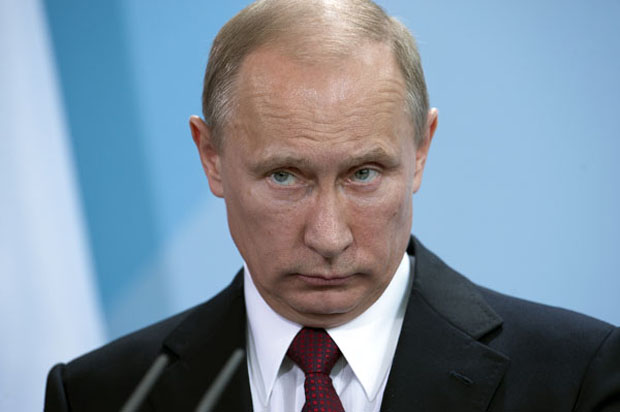
(Photo: Demotix)
Vladimir Putin has returned to his people after a noted absence. Like Jesus Christ, but with a longer interlude. Was Vladimir Vladimirovich on paternity leave? Has he been ill? Did a botox injection go wrong? Was he fending off a coup? Has there, in fact, been a coup? Is this even the real Putin we see before us? Has he been replaced by a KGB cyborg?
It’s all delightfully old-fashioned, as if global politics was being staged by the Secret Cinema people. Any day now, someone will declare that Kremlinology is the hot new thing among urban ABC1 early adopters.
As ever, this column aims to be ahead of the curve. So what do we know?
The near-coincidence of the murder of Boris Nemtsov and the temporary disappearance of the president is bound to raise suspicion. I recall a conversation with an old colleague who grew up under the Soviet system. The idea of “cock up versus conspiracy” came up. I explained haughtily how people were wrong to see invisible hands guiding events when sheer human incompetence was almost always the explanation when things went weird. “Yes,” my friend replied. “But where I’m from, there usually is a conspiracy.”
Fair point.
The rounding up of some Chechens to pin the assassination of Nemtsov on feels almost contemptuous. It’s like the Russian authorities are not even bothering any more, or as if they are hoping to win a medal for sheer chutzpah in the face of the facts.
The suggestion that seems to be gaining ground is that Putin is no longer in charge, or perhaps won’t be for much longer. People such as The Economist’s Ed Lucas, The Times’s Roger Boyes and The Interpreter’s Catherine Fitzpatrick now speak deadly seriously about a return to the Cold War, with Putin outflanked by people who think he is not hardline enough.
A long blogpost on the current situation by Fitzpatrick outlines the scenarios. Former Prime Minister Primikov has issued an ultimatum to Putin, but Primakov himself could not command a move against Putin. Nemtsov had to go because a popular outsider could have caused problems for a palace coup. What is the involvement of Duma Deputy Delimkhanov, a cousin of Chechen President Kadyrov? What is the position of Viktor Zolotov, head of internal troops? It all becomes dizzyingly complicated, like an epic Russian novel, or Woody Allen’s parody of the epic Russian novel, Love and Death: “Alexei loves Tatiana like a sister… Tatiana’s sister loves Trigorian like a brother… Trigorian’s brother is having an affair with my sister, who he likes physically, but not spiritually… The firm of Mishkin and Mishkin is sleeping with the firm of Taskov and Taskov.”
Putin returned this week, not offering an explanation for his 10-day absence, but instead wryly commenting, during a press conference with the president of Kyrgyzstan, Almazbek Atambayev, that “life would be boring without gossip”.
Indeed, Vladimir Vladimirovich. Indeed.
The miasma to the east of the European Union’s borders has become more impenetrable and more obvious since the outbreak of fighting in Ukraine. Events there now take on the characteristics of the title of Peter Pomerantsev’s recent book Nothing Is Real And Everything Is Possible — a state of affairs where the brazen manipulation of truth is taken to staggering levels, to the point where an invasion is not an invasion, a war is somehow not taking place.
The Kremlin and its oligarch clients may not care much for truth, but one would hope that Cambridge University Press would.
CUP has been criticised by the organisers of a book prize for its refusal to publish a book on Russia by one of its own authors in the United Kingdom. According to The Observer, judges of the Pushkin House Russian Book Prize attempted review Putin’s Kleptocracy by Karen Dawisha for competition, but CUP refused to submit it.
“We attempted to get hold of the Dawisha book but the publisher would not submit it to us because of legal advice about UK libel laws. Our judges noted the book and said it raised important issues that deserved a wider audience, but unfortunately could not all get hold of a copy to pass judgment,” Andrew Jack, chair of the judges told the paper.
Disappointing indeed, and confirmation of the continual refusal by CUP to publish this book in the UK. The depressing thing about this, as noted in this column last year, is that CUP has not questioned the veracity of Dawisha’s work.
John Haslam of CUP wrote last year that: “We have no reason to doubt the veracity of what you say, but we believe the risk is high that those implicated in the premise of the book — that Putin has a close circle of criminal oligarchs at his disposal and has spent his career cultivating this circle — would be motivated to sue and could afford to do so. Even if CUP was ultimately successful in defending such a lawsuit, the disruption and expense would be more than we could afford, given our charitable and academic mission.”
I don’t like the language of “bravery” around publishers, but frankly, I’m beginning to doubt CUP’s commitment to the cause of academic freedom. More particularly, one wonders who is offering the company legal advice. Substantive reform to the libel law has made it considerably more difficult for foreigners to bring cases in London. Dawisha is not a fly-by-night hack, but a serious researcher. Conditions for publication are favourable. And faced with an entire Kremlin apparatus which has perfected the use of smoke and mirrors, the world needs all the information it can get.
CUP says it has contacted Dawisha to see “whether we might be able to find a compromise”. But considering they have already admitted there is nothing wrong with the book, it’s difficult to see what Dawisha’s side of the compromise might be.
This thing has dragged on too long now. For God’s sake, Cambridge; just publish the bloody thing.
This article was posted on 19 March 2015 at indexoncensorship.org
20 Feb 2015 | Awards, mobile, Russia
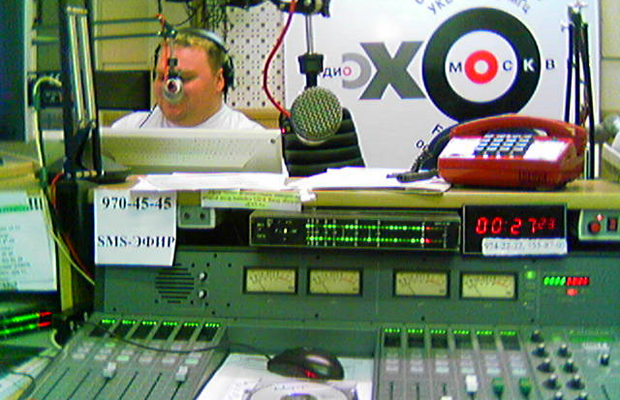
Journalism nominee Ekho Moskvy
Ekho Moskvy (Echo Moscow) is an independent Russian radio station. One of few media outlets that is critical of Vladimir Putin’s regime, it is revered by many as the last bastion of free speech in the country.
Ekho was set up in 1990 by radio veterans jaded with Soviet propaganda, and has taken an interrogative stance towards Russia’s government ever since. Its focus is on maintaining balance – it airs pro and anti-Kremlin voices in equal measure. Its editor-in-chief, Alexei Venediktov, has often done battle with Putin and his government. In 2012 Putin is said to have remarked that Ekho served foreign interests, and “pour[ed] diarrhoea over me day and night”.
During the 1990s, Russia’s news outlets developed into a world-respected critical force. But since Putin came into power in 1999, the media’s role as objective watchdog has diminished, and most news organisations are now resolutely pro-Kremlin.
In 2014, Russia attracted significant international condemnation over its involvement with the Ukraine civil war. In response, Putin began to cultivate an us-versus-them atmosphere in his country which saw his popular approval ratings grow to 80 per cent. Such an atmosphere has little room for dissidence, and anti-government voices have been silenced. The remaining politically independent news outlets are gradually being banned, crippled or brought in line with the Kremlin.
In the autumn 2014 edition of Index on Censorship magazine, contributor Helen Womack interviewed Sergei Buntman, the station’s co-founder. Womack wrote:
“There are various theories as to how Ekho gets away with it. Some say the radio and associated website, with a following of nearly one million in Moscow and three million in the regions, is tolerated because it allows the intelligentsia to let off steam, with little impact on the rest of the TV-watching country. Others say it allows the Kremlin to argue to the world that free speech is not dead in Russia. And one theory has it that Kremlin staff themselves depend on Echo to be properly informed because they can’t rely on their own propaganda.”
Buntman has another explanation, Womack wrote. “It’s no miracle and no wonder,” he told her. “You’d be surprised but a lot actually depends on us. Many journalists just give in too soon; they give up at the first hurdle.”
Last year was especially turbulent for Ekho Moskvy, which fought Putin’s media crackdown on many fronts. Its website was banned in March by Roskomnadzor, Russia’s media watchdog, after it published a blog post by leading opposition figure Alexei Navalny. In December, the Dagestan limb of the station was shut down by Roskomnadzor for no official reason.
The outlet was issued its own warning from Roskomnadzor in October. The watchdog cited two interviews aired by Ekho with journalists who provided first-hand accounts of fighting in eastern Ukraine. Roskomnadzor said the programme contained “information justifying war crimes,” and ordered the station to take down the interview transcripts from its website. Two cautions from Roskomnadzor in a year usually leads to an organisation’s closure.
Alexander Plyushchev, who conducted the banned interviews, was fired by Ekho’s owner Gazprom-Media in November, though Venediktov would later reject the dismissal and reinstate Plyushchev. Ostensibly, Plyushchev was sacked because of an insensitive tweet he had sent about the death of the son of Putin’s chief of staff. But Venediktov has suggested that Plyushchev’s controversial interviews the month before are behind the firing by Gazprom-Media owner Mikhail Lesin, Putin’s former press minister.
Despite challenges, the station’s news coverage was commended for staying true to its spirit of independence. Reports on the fighting between pro-Russian separatists and the Ukraine government were praised for their even-handedness, at a time when the majority of Russian media took a staunchly pro-Kremlin approach. As a result, Venediktov and his colleagues have appeared on several blacklists and have been labelled “enemies of Russia”.
This article was posted on 20 February 2015 at indexoncensorship.org



